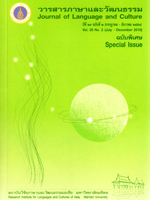Thailand’s health communication: From blurred notions to practical challenges
Main Article Content
Abstract
The issue of health has actively been raised worldwide and more focus has been put on Third World Countries, partly because of increased pandemic and health-related problems. Moreover, this undeniably relates to the quality of life and living standards of the people in those countries. Notably, a goal of UN’s World Health declaration is to promote a better health system, one in which people, who are the grassroots of society, are empowered to gain knowledge and ability to take care of their own health. In response to World Health Declaration, Thailand has been trying to improve its own health system and to promote good public health for decades. It is believed among Thai health policy makers that the establishment of a health communication system in Thailand can facilitate the people’s health standards a great deal. In fact, the idea of setting a “health communication system” is not new, but it is not commonly familiar to the public and involved parties. Aseries of research work under the Popula Health Communication System Research and Development Project starting from 2003 has been conducted to conceptualise the way in which health communication should be systematised and applied in the Thai context. Basing our study on “A Policy Study of Health Communicators and Health Communication Construction” (2006), we found that Thailand has abundant resources and organizations working in the field of health communication. Most importantly, the knowledge gap of Thai people also needs to be filled by using a proper system and technology to pull in all resources and personnel in order to strengthen community participatory and grassroot power. To firmly establish a “professional health communicator” is one of the implications that can help strengthen Thailand’s health communication system. A model in building up health communication system within the Thai context is also proposed, coupled with adiscussion of a policy to support the emergence of healthy communication. Finally, a follow up to the health communication implications reflected through several studies including our research relating to the promotion of ‘holistic health’ in Thailand will also be presented in order to illustrate how the proposed model is coming into play.
Article Details
How to Cite
Doungphummes, N., & Boonsiripunth, M. (2014). Thailand’s health communication: From blurred notions to practical challenges. Journal of Language and Culture, 29(2), 111. retrieved from https://so03.tci-thaijo.org/index.php/JLC/article/view/20240
Section
Research Articles
The articles featured in the Journal of Language and Culture (JLC) constitute academic works representing the viewpoints of the respective author(s). It is crucial to note that these opinions do not necessarily reflect those of the Editorial Board.
All articles published in JLC are released under the Creative Commons Attribution 4.0 International License (CC BY 4.0). This license grants permission for unrestricted use, distribution, and reproduction in any medium, provided proper credit is given to the original author(s) and the source.


